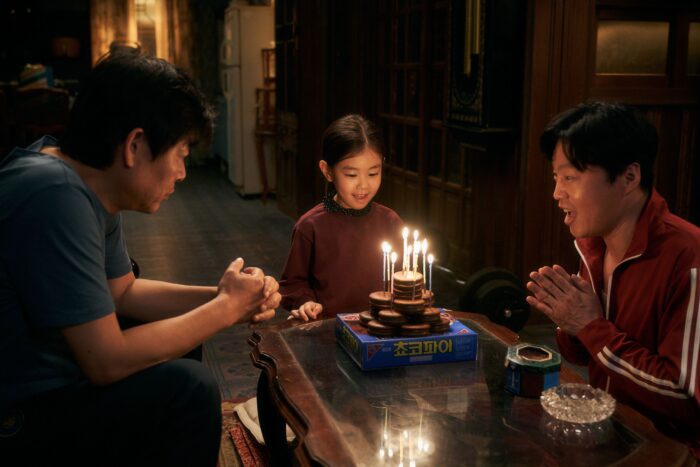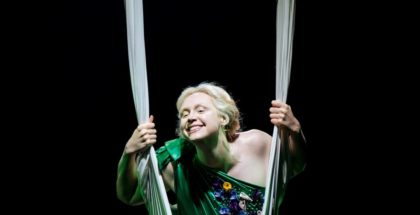London Korean Film Festival heads online for 2020
David Farnor | On 30, Sep 2020
The London Korean Film Festival is returning this October, and will be going online as well as screening films in cinemas.
Its 15th edition will run from 29th October to 12th November, with films playing in London at Picturehouse Central, Genesis Cinema and Rio Cinema. But more than 30 movies will be streaming online for audiences across the UK, along with pre-recorded interviews, live Q&As and virtual events.
Following Parasite’s win at the Oscars, the global spotlight is on Korean cinema like never before, and the LKFF will showcase an eclectic programme featuring the year’s biggest box-office hits, independent cinema, Korean classics, animation, documentary, award-winning shorts, Women’s Voices (championing women filmmakers) and more.
Two shorts from Bong Joon-ho will play as part of the festival – 1994’s Incoherence and 2004’s Influenza. Also included is a rare on-screen performance from director Bong, acting in Kang Dae-hee’s moving short Some Light? (2009).
The opening film will be European Premiere of comedy-inflected tear-jerker Pawn (2019), which revolves around a familial bond that forms from the most unlikely of relationships. The closing film will be the UK Premiere of Kim Jinyu’s Bori (2018), which also focuses on familial bonds, this time exploring the themes of disability and difference through the eyes of an eleven-year-old girl.
A Friends and Family strand programmed by Seoul-based film critic, programmer, and translator of Parasite, Darcy Paquet, will reflect on the way that lockdowns and quarantines have caused us to reassess the relationships we have with those people closest to us. It will include the UK Premiere of director Yoon Dan-bi’s coming-of-age drama Moving On (2019), which finds a teenage girl moving into the home of her elderly grandfather along with her younger brother, cash-strapped father and soon-to-be-divorced aunt. Director Lee Jae-kyoo gathers together a top cast of acting talent including Cho Jin-woong (The Handmaiden) and Yum Jung-ah (A Tale of Two Sisters) for the UK Premiere of tense ensemble drama Intimate Strangers (2018), while Kang Yikwan’s award-winning tale of teenage crime Juvenile Offender (2012) sees a boy back in the custody of a mother he believed dead on his release from juvenile reformatory. Friendship is also at the heart of Lee Joon-ik’s comedy-drama The Happy Life (2007), while Kim Tae-yong’s much-loved Family Ties (2006) questions traditional notions of family.
The Cinema Now strand will highlight the best contemporary titles to have been released in the past year. From Hong Sangsoo, The Woman Who Ran (English Premiere) finds Hong’s now regular star Kim Min-hee (The Handmaiden) playing a wife who, after being left to her own devices when her husband takes a business trip, leads us through a typically breezy, conversation-led set of encounters with three old female friends. Director Kim Cho-hee draws on her own experience as Hong Sangsoo’s longtime producer for her debut work Lucky Chan-sil (UK Premiere), as we follow the producer of a celebrated indie director after the director’s sudden soju-induced death. The directorial debut of Jung Jinyoung is the enigmatic genre-bending mystery Me & Me (European Premiere). Epic action is on the cards in blockbuster Ashfall from directing duo Lee Hae Jun and Kim Byung Seo. Finally, period action-comedy is on show in Kim Joo-ho’s Jesters: The Game Changers (UK Premiere).
Women’s Voices celebrates the work of women filmmakers and gives a platform to challenging, thought-provoking works that bring timely issues to the fore. Kim Mi-jo’s Gull (UK Premiere) finds a market vendor, Obok, drunkenly assaulted by a fellow vendor who wields a position of power as chairman of the market’s redevelopment project. In Lim Sun-ae’s searing drama An Old Lady (UK Premiere) an elderly woman is raped by a young male nurse, and similarly disbelieved by the police and those around her, with the handsome young aide claiming the relationship was consensual.
The Documentary strand comprises a trio of enlightening films that give voices to women from different cross-sections of Korean society, icnluding Even Little Grass Has Its Own Name (1990) from director Kim Soyoung, Byun Young-joo’s moving My Own Breathing (1999) and Itaewon (2016), from director Kangyu Garam.
The Classics strand focuses on three stunning retrospective titles to shine a light on Mudang: Korean Shamans on Screen. Korea’s traditional shaman, Mudang, acts as an intermediary between the human world and the spiritual world. Im Kwon-taek’s Divine Bow (1979) finds the local shaman on strike as flashbacks reveal the tragic source of her grievances, and Daughter of Fire (1983), also by Im Kwon-taek, finds a man haunted by memories of his shaman mother which lead him on a journey to Jindo Island and its shaman ceremonies. Eul-hwa (1979), directed by Byun Jang-ho, sees a woman train to become a Mudang after visiting the village shaman when her son is sick.
The Animation strand includes Underdog (Lee Choon-baek, Oh Sung-yoon, 2018), Jeong Dahee’s Movements (2019), Mascot (Kim Leeha, 2019), The Levers (Kim Boyoung, 2018) and The End of the Universe (Han Byung-a, 2020).
The Shorts strand offers an exciting overview of some of the best up-and-coming directors with a selection of fresh, creative and endlessly inventive works: The Thread (Lee Na-yeon, Cho Min-jae, 2020); Before The Summer Passes (Kim So-hyoung, 2020); God’s Daughter Dances (Byun Sung-bin, 2020); The Long Night (Kim Jung-min, 2020); Suspicion (Park Woo-geon, 2020); Us, Day and Night (Kim So-hyoung, 2020); Hide and Seek (Kim Do-yeon, 2020); and Roof-Top star (Lee Kun-hwi, 2019).
The Artist Video strand is comprised of two distinct Artist in Focus programmes, each one shining a spotlight on the body of work of an artist whose subtle, intricate and ambiguous work rallies against the status quo. The Mooijn Brotherscomprise of three siblings, Jung Mujin, Jung Hyoyoung, Jung Youngdon, whose sensitive engagement with the contemporary moment culminates in constellations of moving image, installation, community project and publication. Where the Moojin Brothers’ work looks to the world around them, Seo Young Chang looks inward to echo how the power of a structure can shape one’s experience, working with installations of moving image and sculpture to focus on the (in)visibility of corporeal existence and the physical pain that collapses the network of time and space of a body, generating an unproductive entity. The selected videos will guide audiences through different states of existence and trouble the conceptual and physical definition of a living body, exploring the fragile and precarious nature of human beings and how invisible conditions can determine human agency.
Tickets will be available from early October – stay tuned for more details. Until then, visit koreanfilm.co.uk for information.


















